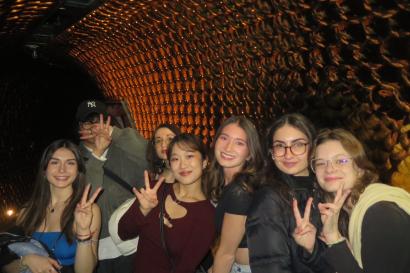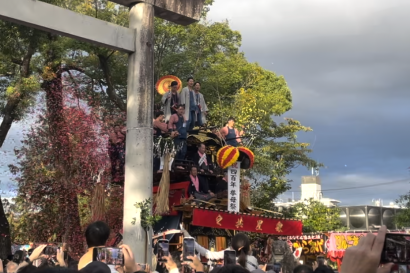My first experience in Nagoya turned out to be Influenza.
Riding the Shinkansen (bullet train) from Tokyo to Nagoya with a raging fever is not an experience I would wish on anyone. Words cannot describe my desperation as I suffered for a good 30 minutes, watching the cleaning ladies, recognizable by their bright pink uniforms, clean the Shinkansen from its last journey. Given that Tokyo tends to be the first and last stop of many trains, this was not a surprise, but an excruciating wait nonetheless. I felt like a parched traveler in a desert, and making it to the hotel was like just finding an oasis, the five minute walk from the station in the rain agony as it felt more like hail. I know this all sounds pretty dramatic, but when you're that sick everything is a lot more difficult than it should be.
I thought a nice, long sleep would be good enough to cure the worst symptoms, and I woke up feeling a little better. By morning I donned the face mask, a social obligation for sick people in Japan, and was mingling with my new peers, thinking nothing of my constant fatigue and heavy limbs. I made it all the way to Inuyama, a town about an hour away from Nagoya where IES Abroad Nagoya hosts its orientation, and through the first half of the orientation, before I was kindly advised to go rest. My continued mild fever, lack of appetite, and loss of voice led me to believe this was no mere cold.
Since I've never had influenza before, I can't compare my hospital treatment here to what it would have been in America, but it was an interesting adventure. I asked the program adviser Satoshi to take me to the hospital, where they gave me a hospital patient card and placed me in an isolated waiting room after taking my temperature. I quickly learned this was the fever room, where I was given an Influenza test (by having something shoved up both my nostrils, which was not much fun either) and waited to be diagnosed alongside my fellow (probably) influenza-infected patients. After my diagnosis of Type B influenza, I was placed in a waiting room under a stair case separated by only a curtain, and I wondered why I had been moved at all. My visit with the doctor was very short, but I was prescribed plenty of medicine. One of the most interesting medicines was a simple bottle, like one you spray up your nostrils for a runny nose, but you had to put it in your mouth and inhale, pushing the middle out and back in that apparently accessed two chambers of medicine. This was specifically created to treat influenza, and it worked like a charm! I felt so much better, I decided I wanted to try eating dinner with the rest of the IES Abroad group.
Little did I know that this diagnosis would lead to five days of government mandated quarantine. Excused absences are hard to come by here in Japan, but influenza is a case one is actually forbidden from going to work or school to stop the infection from spreading. I spent the remaining days of orientation alone in my hotel room, where my food was brought to my room and my only visitor continued to be Satoshi (and occasionally the other IES Abroad Nagoya program head, Masae). The quarantine is apparently severe enough that I had to take a taxi separate from everyone else to a hotel by Nagoya station, where I spent another 3 days waiting for my symptoms to disappear. I lost track of the days after a while, but I'm fairly certain I spent a good week recovering from the illness long after I would have declared myself healthy enough to return back to school back home. (Granted, two of those days were spent believing this illness was a simple cold). There was nothing I wanted more than to meet my new host family and go home, where I could rest and recover and not be completely by myself. (Well, Satoshi continued to visit me daily! My needs continued to be taken care of and not once did I feel forgotten, for that I am grateful to the staff of IES Abroad Nagoya).
Despite this strict quarantine I had to go out and buy my own lunches throughout my stay in the Nagoya hotel with the only requirement being I wear a sickness mask. If I was allowed to go out and buy food, therefore interacting with the general populace, why I wasn't allowed to go home? Japan is a country of contradictions, but that is a discussion for another blog post.

Naomi Wolfe
<p>My name is Naomi Wolfe and I am a Japanese major and Sociology minor studying in Japan for the 2016-2017 academic year in the hopes of understanding Japanese culture, people, and society. I studied in the Tokyo Language & Culture Program for the fall semester and cannot wait to see what else I can learn in the Nagoya Direct Enrollment Program in the spring semester!</p>





